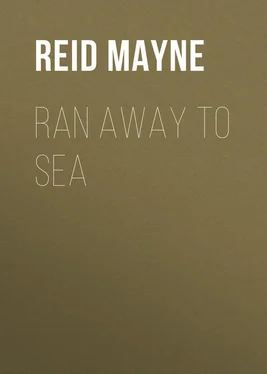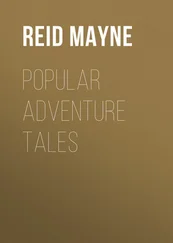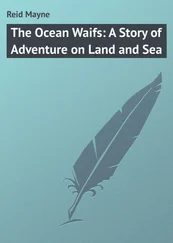Mayne Reid - Ran Away to Sea
Здесь есть возможность читать онлайн «Mayne Reid - Ran Away to Sea» — ознакомительный отрывок электронной книги совершенно бесплатно, а после прочтения отрывка купить полную версию. В некоторых случаях можно слушать аудио, скачать через торрент в формате fb2 и присутствует краткое содержание. Жанр: literature_19, foreign_antique, foreign_prose, foreign_children, на английском языке. Описание произведения, (предисловие) а так же отзывы посетителей доступны на портале библиотеки ЛибКат.
- Название:Ran Away to Sea
- Автор:
- Жанр:
- Год:неизвестен
- ISBN:нет данных
- Рейтинг книги:4 / 5. Голосов: 1
-
Избранное:Добавить в избранное
- Отзывы:
-
Ваша оценка:
- 80
- 1
- 2
- 3
- 4
- 5
Ran Away to Sea: краткое содержание, описание и аннотация
Предлагаем к чтению аннотацию, описание, краткое содержание или предисловие (зависит от того, что написал сам автор книги «Ran Away to Sea»). Если вы не нашли необходимую информацию о книге — напишите в комментариях, мы постараемся отыскать её.
Ran Away to Sea — читать онлайн ознакомительный отрывок
Ниже представлен текст книги, разбитый по страницам. Система сохранения места последней прочитанной страницы, позволяет с удобством читать онлайн бесплатно книгу «Ran Away to Sea», без необходимости каждый раз заново искать на чём Вы остановились. Поставьте закладку, и сможете в любой момент перейти на страницу, на которой закончили чтение.
Интервал:
Закладка:
The river was not over two hundred yards in width, and as the barque was anchored about midway, of course the canoe had not far to come. In a few seconds it was alongside, and I had a fair and full view of its dusky rowers.
As I regarded them the reflection passed through my mind, that if these were a fair specimen of their countrymen, the less acquaintance with them the better; and I could now comprehend the remark of Brace, that to desert from the ship on the African coast would be sheer madness. “Bad,” said he, “as are these fellows on board the Pandy , still they have white skins and something human about them; but as for the rascals we are to meet over yonder they are devils, both soul and body – you shall see ’em, my boy, and judge for yourself.” These remarks my patron had made some days before, when we were talking of our intention to escape; and as I looked into that long canoe, and scanned the faces of the half-score of men that sat within it, I was forcibly struck with the truthfulness of the assertion. A more ferocious set of men I never looked upon – very devils did they appear!
There were eleven of them in all, and most of them were as black as shoe-leather, though there was a variety of colour, from jet-black to a bad tawny-yellow. It was evident they were not all of one race, for there is scarcely any part of the western coast of Africa where there is not an admixture of different races, – arising, no doubt, from the long-continued slave-traffic between the coast and the interior. If these eleven gentlemen differed slightly in colour, there were other points in which they differed not at all. All of them had thick lips, beetle-brows, short kinky wool upon their heads, and the most ferocious and brutal expression upon their faces. Eight out of the eleven were naked as at the hour of their birth, with the exception of a narrow swathing of cotton cloth around their hips and thighs. These eight used the paddles, and I could perceive that they had spears and old muskets in the boat beside them. The other three were of superior class. Two of them were better clad than the eight rowers – but no better looking – while the third presented to the eye an aspect at once so hideously tierce, and yet so ludicrous, that it was difficult to determine whether you ought to laugh at or to fear him.
This man was a true negro, – black as gun powder, gross as a water-butt, and of enormous dimensions. His face was not so negrofied (if I may use the word) as some of his companions’, but it had a still worse expression than that of the very thick-lipped kind, for it was not stupid like theirs. On the contrary, it exhibited a mixture of ferocity with a large share of cunning – a countenance, in fact, full of all wickedness. It resembled a good deal the faces I have afterwards observed in India, – among the fat despotic princes that are still permitted to misrule some portions of that unhappy land, – and a large black beard, whiskers, and moustache, added to the similitude.
It was not the face, nor the great size of the man that rendered him ridiculous. Quite the contrary. A glance at these had rather an opposite tendency. What was laughable about him was his costume; and if he had been done up for a farce upon the stage, or a Christmas pantomime, he could not have been dressed in a more ludicrous manner. Upon his body was a uniform coat of bright-scarlet cloth, the cut and facings of which told that it had once done duty in the army of King George. It had been a sergeant’s full-dress coat, for the chevrons were still upon the cuffs, – and a stout sergeant he must have been, – one of the stoutest in the army. The coat was a large one, yet, withal, it was a tight fit for its present wearer, and did not come within a foot of buttoning upon him. The sleeves, moreover, were too short by inches, and the huge black wrists of the negro appeared in strange contrast with the bright sheen of the scarlet. Behind, the skirts forked widely apart, showing the huge buttocks of the wearer, that were covered by the tails of a striped sailor’s shirt reaching a little below; and below this again, the huge, thick, black thighs and lower limbs were naked to the toes.
An old cocked-hat with faded lace and feathers, that no doubt had once graced the head of some admiral or commodore, sat high upon the woolly crown of her new acquaintance, and completed the absurd tout ensemble . There was a long knife stuck in his belt, and a large crooked sabre dangling between his limbs.
It would have been laughable enough – such a singular apparition under other circumstances – but I perceived on the part of the Pandora’s crew no disposition to laugh. A strict order from the captain had been issued against such behaviour; and enjoining all on board to receive “His Majesty King Dingo Bingo” with all courtesy and respect.
So, then he of the tight coat and cocked-hat was a king – King “Dingo Bingo!” The two that were partially clad were his councillors, and the eight black canoe-men a portion of his bodyguard.
I did not make all these observations while the new comers were in the canoe. There had been no time for that. The moment they approached the side of the barque, ropes had been thrown to them, and the canoe was hauled close up. A ladder had already been let over the gangway, and up this “His Majesty” climbed, and was received on board with all the honours.
Joyful salutes passed between him and his well-known acquaintance, the captain; and, without more ado, the latter led the way across the quarter-deck, and conducted his majesty to the cabin with apparent formality, but yet in a frank and jovial manner that proved the two to be old friends – the best friends in the world.
The mate did his best to entertain the two “Councillors of State,” while the men of the bodyguard remained below in the canoe. His majesty had no fear for his personal safety. He knew the slaver and her master. He had been expecting them, and therefore needed to ask no questions about country or character. The skipper and the king understood each other.
Chapter Fourteen
I could not tell what was said between these two worthies, but I knew what was to be done. His majesty had a crowd of poor negroes not far off – no doubt shut up in the large building which could be partially seen through the trees. These he had procured from some back country in the interior – partly by traffic with other king-monsters like himself, and partly by means of man-hunting expeditions, which he had made with his ferocious troops. It was highly probable, too, that among the victims about to be transported were many who had been his own subjects; for these African potentates do not scruple to make merchandise of their own people, when cash or “cowries” run short, and their enemies have been too strong to be captured.
Just such a crowd then had King Dingo Bingo got together; and the joyful smile that lighted up the jovial face of the skipper, as he reappeared upon deck, proved that it was a large crowd, and that he was sure of a full “cargo” without further trouble or delay. Often competition among the slave-vessels renders it difficult to obtain a full “freight;” and in such cases the white slave-dealers, who dwell upon the coast (for there are many such), and the native chiefs become terribly exacting. Then indeed, the first cost of the human merchandise forms an important item in the invoice, and the profits on the other side are proportionately diminished; but where there is no competition the price of the black is considered a mere trifle; and, taken in “barter” as he is, a whole ship’s load of such “bales,” as they are jocularly called among slavers (by the Spaniards termed “bultos”), is not such an expensive investment. The purchase of the vessel, the wages and keep of the crew (necessarily a large one), are the main items of outlay in the books of a slaver. As for the food of the living cargo, that counts for little. It is of the simplest and coarsest kind that can be procured, and usually consists of two staple articles; the African millet – known more commonly as a species of sago – and palm-oil. Both are easily obtained on any part of the western coast where the slave-trade exists; for there both these articles form the common food of the country. The millet is a well-known grain; but there are many sorts of grain in different parts of the world which go under this name, and yet are obtained from plants that are very distinct in character. As for the palm-oil, it is at present one of the most important items of African commerce, and thousands of tons of it are annually imported into England and France, where it is used in the manufacture of yellow soap. It is extracted from the nut of a large palm-tree, whole forests of which may be seen in the western countries of tropical Africa, with the fallen nuts lying scattered over the ground as thick as pebbles; and, up to a late period, scarce cared for by the native inhabitants. The demand for palm-oil, however, has of late years stimulated even the indolent negroes to the manufacture of the article, and these immense palm-orchards are now carefully preserved, and their fruit gathered at the proper season.
Читать дальшеИнтервал:
Закладка:
Похожие книги на «Ran Away to Sea»
Представляем Вашему вниманию похожие книги на «Ran Away to Sea» списком для выбора. Мы отобрали схожую по названию и смыслу литературу в надежде предоставить читателям больше вариантов отыскать новые, интересные, ещё непрочитанные произведения.
Обсуждение, отзывы о книге «Ran Away to Sea» и просто собственные мнения читателей. Оставьте ваши комментарии, напишите, что Вы думаете о произведении, его смысле или главных героях. Укажите что конкретно понравилось, а что нет, и почему Вы так считаете.












